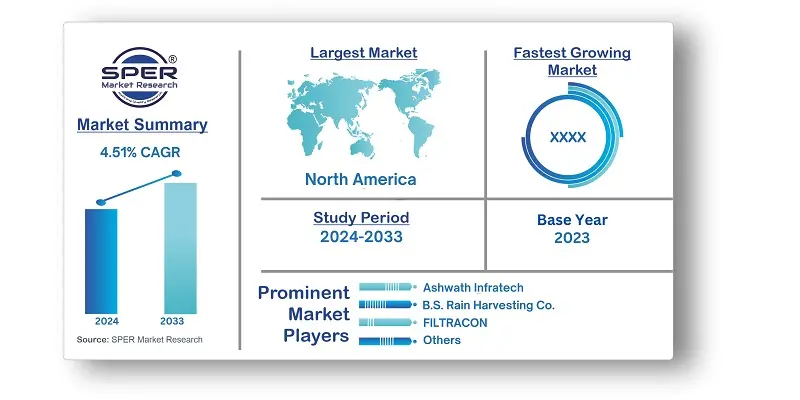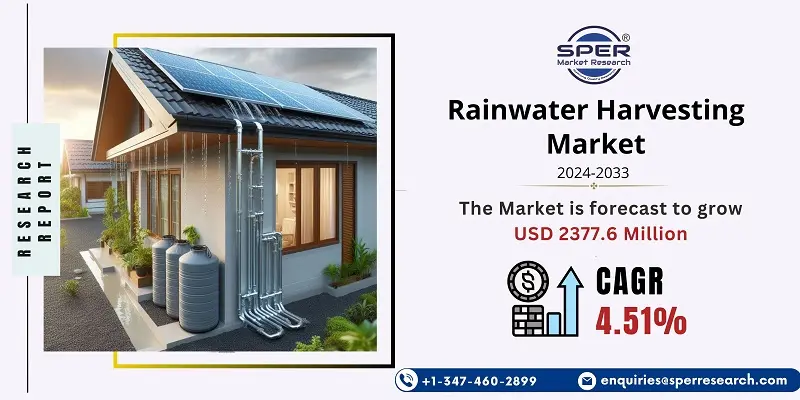
Rainwater Harvesting Market Growth, Size, Trends, Share, Demand, Revenue and Future Outlook
Rainwater Harvesting Market Size- By Type, By Harvesting Methods, By Application- Regional Outlook, Competitive Strategies and Segment Forecast to 2033
| Published: Jul-2024 | Report ID: POAE2467 | Pages: 1 - 239 | Formats*: |
| Category : Power & Energy | |||
- March 2021; In order to provide clean and drinkable water to the local population, Watts Water Technologies Inc. collaborated with the Planet Water Foundation to create an inclusive water system in a Vietnamese city. Watts Water Technologies' involvement highlights their commitment to corporate social responsibility and their dedication to addressing global water needs through impactful community projects.
- August 2022; Leading the way in sustainable water management, GRAF Group has inaugurated a new location in Neuried, Germany. In response to the growing demand for rainwater storage brought on by climate change and the increased focus on environmental conservation, this facility specializes in making big containers. The calculated growth increases GRAF Group's ability to address the growing demand for environmentally friendly water solutions.


| Report Metric | Details |
| Market size available for years | 2020-2033 |
| Base year considered | 2023 |
| Forecast period | 2024-2033 |
| Segments covered | By Type, By Harvesting Method, By Application |
| Regions covered | North America, Asia-Pacific, Latin America, Middle East & Africa and Europe |
| Companies Covered | Ashwath Infratech, B.S. Rain Harvesting Co., FILTRACON, Graf UK Ltd, Harvest Rain, Heritage Water Tanks, Innovative Water Solutions LLC, Kingspan, Rainwater Connection, Rainwater Harvesting Ltd, Tosca Tech Rain Water Harvesting System, Water Field Technologies Pvt. Ltd., Watts Water Technologies. |
- Residential Sector
- Commercial Sector
- Agricultural Sector
- Municipalities and Government Bodies
- Water Utilities
- Environmental Organizations
| By Type: |
|
| By Harvesting Method: |
|
| By Application: |
|
- Global Rainwater Harvesting Market Size (FY’2024-FY’2033)
- Overview of Global Rainwater Harvesting Market
- Segmentation of Global Rainwater Harvesting Market by Type (Rain Barrel System, Dry System, Wet System, Green Roof System)
- Segmentation of Global Rainwater Harvesting Market by Harvesting Method (Above Ground Harvesting, Under Ground Harvesting)
- Segmentation of Global Rainwater Harvesting Market by Application (Industrial, Commercial, Residential, Agricultural)
- Statistical Snap of Global Rainwater Harvesting Market
- Expansion Analysis of Global Rainwater Harvesting Market
- Problems and Obstacles in Global Rainwater Harvesting Market
- Competitive Landscape in the Global Rainwater Harvesting Market
- Impact of COVID-19 and Demonetization on Global Rainwater Harvesting Market
- Details on Current Investment in Global Rainwater Harvesting Market
- Competitive Analysis of Global Rainwater Harvesting Market
- Prominent Players in the Global Rainwater Harvesting Market
- SWOT Analysis of Global Rainwater Harvesting Market
- Global Rainwater Harvesting Market Future Outlook and Projections (FY’2024-FY’2033)
- Recommendations from Analyst
1.1. Scope of the report1.2. Market segment analysis
2.1. Research data source2.1.1. Secondary Data2.1.2. Primary Data2.1.3. SPER’s internal database2.1.4. Premium insight from KOL’s2.2. Market size estimation2.2.1. Top-down and Bottom-up approach2.3. Data triangulation
4.1. Driver, Restraint, Opportunity and Challenges analysis4.1.1. Drivers4.1.2. Restraints4.1.3. Opportunities4.1.4. Challenges4.2. COVID-19 Impacts of the Global Rainwater Harvesting Market.
5.1. SWOT Analysis5.1.1. Strengths5.1.2. Weaknesses5.1.3. Opportunities5.1.4. Threats5.2. PESTEL Analysis5.2.1. Political Landscape5.2.2. Economic Landscape5.2.3. Social Landscape5.2.4. Technological Landscape5.2.5. Environmental Landscape5.2.6. Legal Landscape5.3. PORTER’s Five Forces5.3.1. Bargaining power of suppliers5.3.2. Bargaining power of buyers5.3.3. Threat of Substitute5.3.4. Threat of new entrant5.3.5. Competitive rivalry5.4. Heat Map Analysis
6.1. Global Rainwater Harvesting Market Manufacturing Base Distribution, Sales Area, Product Type6.2. Mergers & Acquisitions, Partnerships, Product Launch, and Collaboration in Global Rainwater Harvesting Market
7.1. Global Rainwater Harvesting Market Size, Share and Forecast, By Type, 2020-20267.2. Global Rainwater Harvesting Market Size, Share and Forecast, By Type, 2027-20337.3. Rain Barrel System7.4. Dry System7.5. Wet System7.6. Green Roof System
8.1. Global Rainwater Harvesting Market Size, Share and Forecast, By Harvesting Method, 2020-20268.2. Global Rainwater Harvesting Market Size, Share and Forecast, By Harvesting Methods, 2027-20338.3. Above Ground Harvesting8.4. Under Ground Harvesting
9.1. Global Rainwater Harvesting Market Size, Share and Forecast, By Application, 2020-20269.2. Global Rainwater Harvesting Market Size, Share and Forecast, By Application, 2027-20339.3. Industrial9.4. Commercial9.5. Residential9.6. Agricultural
10.1. Global Rainwater Harvesting Market Size and Market Share
11.1. Global Rainwater Harvesting Market Size and Market Share By Region (2020-2026)11.2. Global Rainwater Harvesting Market Size and Market Share By Region (2027-2033)11.3. Asia-Pacific11.3.1. Australia11.3.2. China11.3.3. India11.3.4. Japan11.3.5. South Korea11.3.6. Rest of Asia-Pacific11.4. Europe11.4.1. France11.4.2. Germany11.4.3. Italy11.4.4. Spain11.4.5. United Kingdom11.4.6. Rest of Europe11.5. Middle East and Africa11.5.1. Kingdom of Saudi Arabia11.5.2. United Arab Emirates11.5.3. Qatar11.5.4. South Africa11.5.5. Egypt11.5.6. Morocco11.5.7. Nigeria11.5.8. Rest of Middle-East and Africa11.6. North America11.6.1. Canada11.6.2. Mexico11.6.3. United States11.7. Latin America11.7.1. Argentina11.7.2. Brazil11.7.3. Rest of Latin America
12.1. ASHWATH INFRATECH12.1.1. Company details12.1.2. Financial outlook12.1.3. Product summary12.1.4. Recent developments12.2. B.S. RAIN HARVESTING CO.12.2.1. Company details12.2.2. Financial outlook12.2.3. Product summary12.2.4. Recent developments12.3. FITRACON12.3.1. Company details12.3.2. Financial outlook12.3.3. Product summary12.3.4. Recent developments12.4. GRAF UK LTD12.4.1. Company details12.4.2. Financial outlook12.4.3. Product summary12.4.4. Recent developments12.5. HERITAGE WATER TANKS12.5.1. Company details12.5.2. Financial outlook12.5.3. Product summary12.5.4. Recent developments12.6. INNOVATIVE WATER SOLUTIONS LLC12.6.1. Company details12.6.2. Financial outlook12.6.3. Product summary12.6.4. Recent developments12.7. KINGSPAN12.7.1. Company details12.7.2. Financial outlook12.7.3. Product summary12.7.4. Recent developments12.8. RAINWATER CONNECTION12.8.1. Company details12.8.2. Financial outlook12.8.3. Product summary12.8.4. Recent developments12.9. TOSCA TECH RAIN WATER HARVESTING SYSTEM12.9.1. Company details12.9.2. Financial outlook12.9.3. Product summary12.9.4. Recent developments12.10. WATER FIELD TECHNOLOGIES PVT. LTD.12.10.1. Company details12.10.2. Financial outlook12.10.3. Product summary12.10.4. Recent developments12.11. WATTS WATER TECHNOLOGIES12.11.1. Company details12.11.2. Financial outlook12.11.3. Product summary12.11.4. Recent developments
SPER Market Research’s methodology uses great emphasis on primary research to ensure that the market intelligence insights are up to date, reliable and accurate. Primary interviews are done with players involved in each phase of a supply chain to analyze the market forecasting. The secondary research method is used to help you fully understand how the future markets and the spending patterns look likes.
The report is based on in-depth qualitative and quantitative analysis of the Product Market. The quantitative analysis involves the application of various projection and sampling techniques. The qualitative analysis involves primary interviews, surveys, and vendor briefings. The data gathered as a result of these processes are validated through experts opinion. Our research methodology entails an ideal mixture of primary and secondary initiatives.



Frequently Asked Questions About This Report
PLACE AN ORDER
Year End Discount
Sample Report
Pre-Purchase Inquiry
NEED CUSTOMIZATION?
Request CustomizationCALL OR EMAIL US
100% Secure Payment






Related Reports
Our Global Clients
Our data-driven insights have influenced the strategy of 200+ reputed companies across the globe.




















